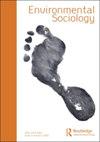Towards eco-social policies to tackle the socio-ecological crisis: energy poverty as an interface between welfare and environment
IF 2.8
Q3 ENVIRONMENTAL STUDIES
引用次数: 1
Abstract
ABSTRACT The interplay between the environmental issues – embedded in the climate crisis – and the sustainability of welfare systems is a recent research topic that is unfolding the complexities behind the environmental and the fiscal crises. Drawing on an extensive literature, this paper fits in this debate with a theoretical focus on ‘eco-welfare’ and the relevant eco-social policies seen as viable solutions to tackle the twofold socio-ecological crisis. The article discusses how the two crises are addressed by mainstream policies, and then it sets out the eco-welfare framework. In so doing, the paper enhances the relevance of pre-distribution factors in recognizing the interdependencies between social and environmental sustainability. Subsequently, the paper identifies energy poverty as a meaningful research topic to be addressed through an eco-welfare framework, by posing a peculiar attention to the social determinants behind the notion of ‘fuel poor’. Overall, the paper discusses both the contents of the environmental welfare state at a time of socio-ecological crisis, and the multidimensional aspects of energy poverty.制定生态社会政策以应对社会生态危机:能源贫困是福利和环境之间的接口
环境问题(隐含在气候危机中)与福利制度的可持续性之间的相互作用是最近的一个研究课题,它揭示了环境危机和财政危机背后的复杂性。借鉴大量文献,本文将理论重点放在“生态福利”和相关的生态社会政策上,这被视为解决双重社会生态危机的可行方案。本文讨论了当前主流政策如何应对这两大危机,并在此基础上提出了生态福利的框架。在这样做时,本文加强了分配前因素在认识社会和环境可持续性之间相互依赖关系方面的相关性。随后,本文通过对“燃料贫乏”概念背后的社会决定因素的特殊关注,将能源贫困确定为一个有意义的研究课题,通过生态福利框架来解决。总体而言,本文讨论了社会生态危机时期环境福利国家的内容,以及能源贫困的多维方面。
本文章由计算机程序翻译,如有差异,请以英文原文为准。
求助全文
约1分钟内获得全文
求助全文
来源期刊

Environmental Sociology
ENVIRONMENTAL STUDIES-
CiteScore
4.60
自引率
12.00%
发文量
34
期刊介绍:
Environmental Sociology is dedicated to applying and advancing the sociological imagination in relation to a wide variety of environmental challenges, controversies and issues, at every level from the global to local, from ‘world culture’ to diverse local perspectives. As an international, peer-reviewed scholarly journal, Environmental Sociology aims to stretch the conceptual and theoretical boundaries of both environmental and mainstream sociology, to highlight the relevance of sociological research for environmental policy and management, to disseminate the results of sociological research, and to engage in productive dialogue and debate with other disciplines in the social, natural and ecological sciences. Contributions may utilize a variety of theoretical orientations including, but not restricted to: critical theory, cultural sociology, ecofeminism, ecological modernization, environmental justice, organizational sociology, political ecology, political economy, post-colonial studies, risk theory, social psychology, science and technology studies, globalization, world-systems analysis, and so on. Cross- and transdisciplinary contributions are welcome where they demonstrate a novel attempt to understand social-ecological relationships in a manner that engages with the core concerns of sociology in social relationships, institutions, practices and processes. All methodological approaches in the environmental social sciences – qualitative, quantitative, integrative, spatial, policy analysis, etc. – are welcomed. Environmental Sociology welcomes high-quality submissions from scholars around the world.
 求助内容:
求助内容: 应助结果提醒方式:
应助结果提醒方式:


